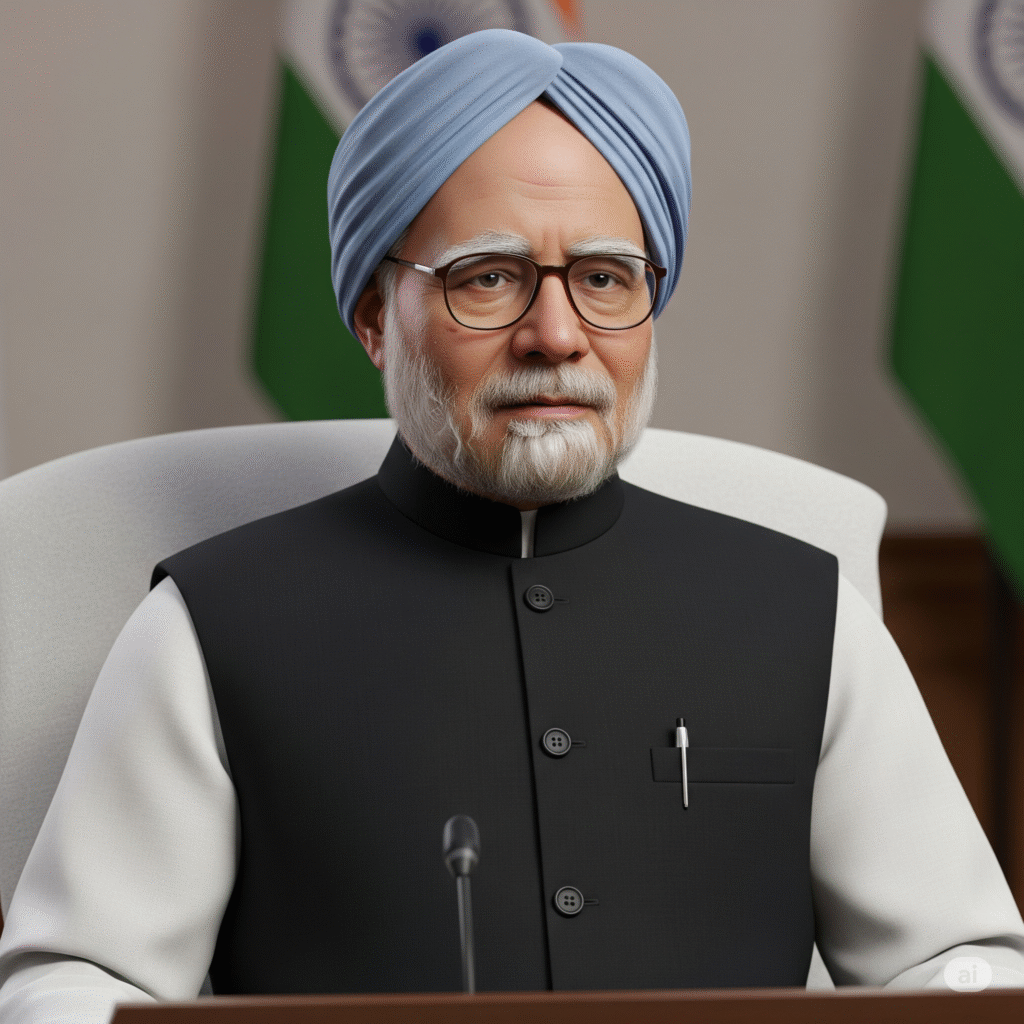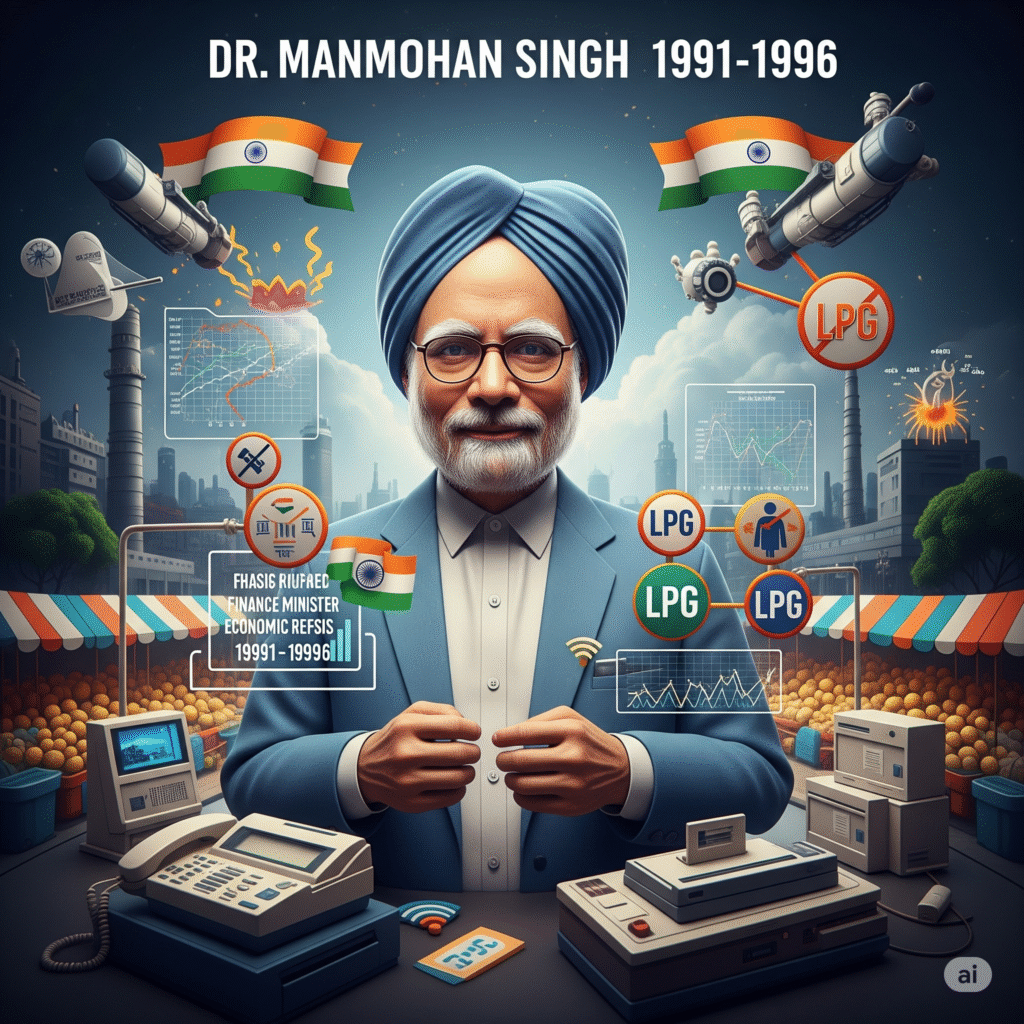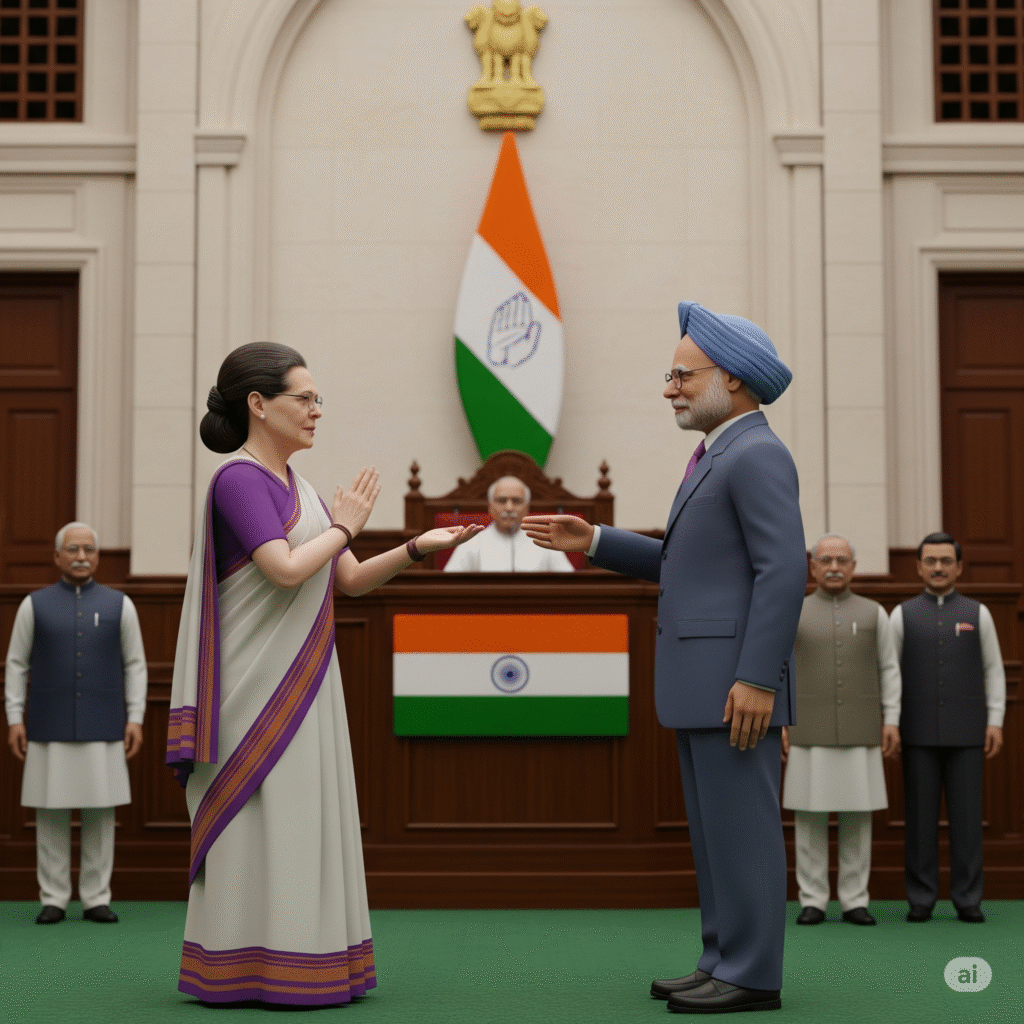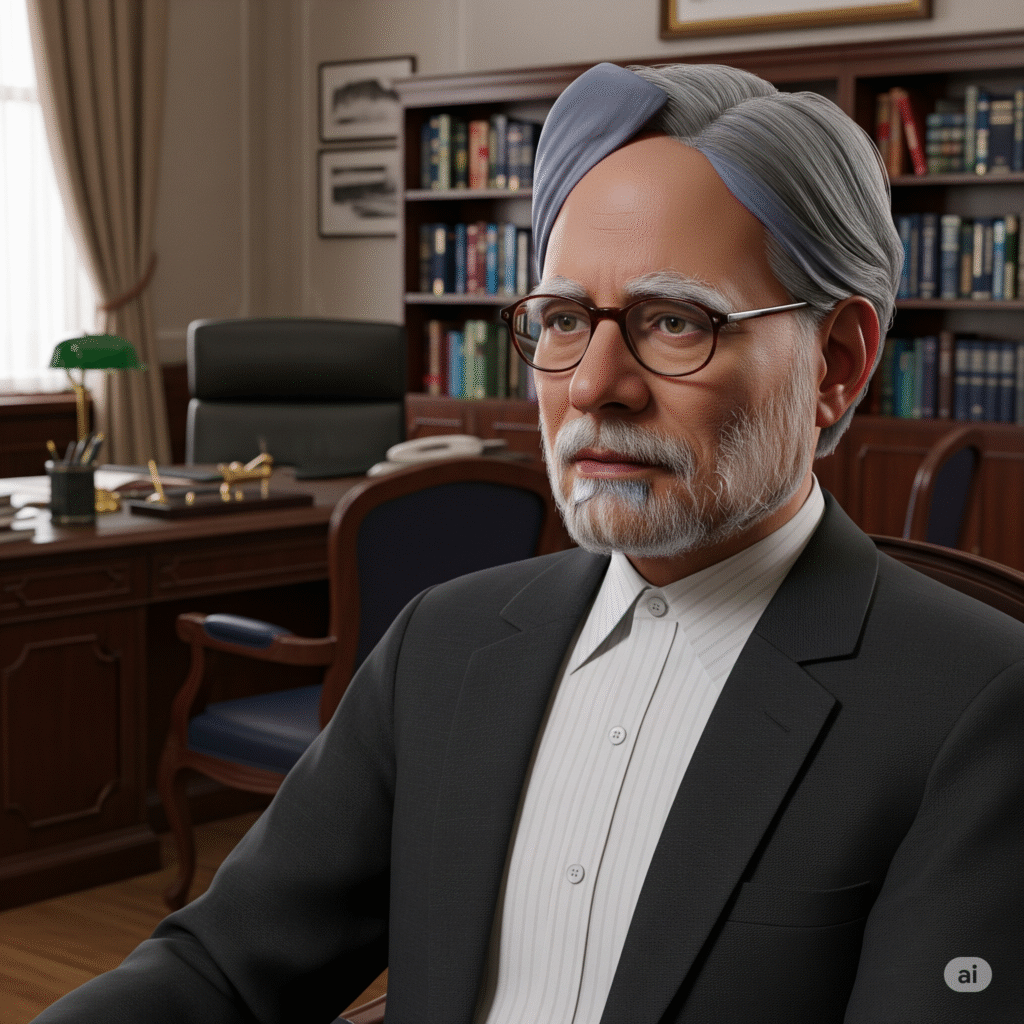
Biography of Dr Manmohan Singh
Name: Dr. Manmohan Singh
Born: 26 September 1932
Place of Birth: Gah (now in Pakistan’s Punjab province)
Occupation: Economist , Politician
Fame: 13th Prime Minister of India ( 2004–2014)
Party: Indian National Congress
Religion: Sikh
Early life and education
Dr. Manmohan Singh was born in a village named Gah in present-day Pakistan before the partition of India. After the partition, his family came to India. He received his early education in Punjab. Later , he proceeded for higher education and obtained a bachelor’s degree (B.A.) from Punjab University (Chandigarh).
Dr. Singh obtained a first class postgraduate degree in economics from the University of Cambridge (United Kingdom). He then obtained a doctorate ( D.Phil.) from the University of Oxford on the subject “Trade , Monetary and Public Finance of India” .
His academic achievements were exceptional. He was a brilliant student and received many awards.
Professional Life
Economic expertise
Dr. Manmohan Singh’s professional life began as an economist. He held various high positions , such as:
- Governor of the Reserve Bank of India ( 1982–1985)
- Deputy Chairman of Planning Commission
- Finance Secretary to the Government of India
- Economic Advisor to the United Nations
His expertise lies particularly in the areas of developing economies and public finance.
As Finance Minister
In 1991 , when India was facing a serious economic crisis , the then Prime Minister P.V. Narasimha Rao appointed Dr. Manmohan Singh as the Finance Minister.
Under his leadership the process of economic liberalization began:
- Curtailment of Licence Raj
- Promoting privatisation
- Formulating policies to attract foreign investment
- Improve business
These reforms took the Indian economy into a new era.
His historic budget speech ( 1991) is still considered a milestone in Indian economic history.
As Prime Minister
Dr. Manmohan Singh took over as Prime Minister in 2004 after the victory of the United Progressive Alliance ( UPA) led by the Indian National Congress . He became Prime Minister again in 2009 and remained in this position till 2014 .
Major achievements of his tenure:
- Launch of MNREGA (Rural Employment Guarantee Scheme)
- Implementation of Right to Information Act ( RTI Act)
- Indo-US Nuclear Deal ( 2008)
- Significant reforms in education and health sector
- Significant increase in economic growth rate
Challenges
2G spectrum scam , Commonwealth Games scam) also surfaced during his tenure , which hurt the image of his government.
However , Dr. Singh’s personal honesty and simplicity were widely appreciated.
personal life
Dr. Manmohan Singh is married to Gursharan Kaur. He has three daughters. He has a calm , humble and scholarly personality. He has an interest in reading books and academic discussions.
He is still considered a respected personality in Indian politics for his simplicity and transparency.
Major Awards and Honours
- Padma Vibhushan ( 1987)
- World Statesman Award ( 2010)
- Honorary degrees from several international universities
- Awarded with many national and international honors
conclusion
Dr. Manmohan Singh is a leader who not only changed the economic direction of India but also strengthened India’s image at the global level. Due to his honesty , scholarship and dedication, he has become a unique symbol of Indian politics.
His life is an inspiration of how the biggest changes can be brought about with knowledge , patience and simplicity.
Early life and Education
Dr. Manmohan Singh was born on 26 September 1932 in a Sikh family in Gah village of Punjab province of British India (now in Pakistan). His childhood was spent in simple surroundings. When India was partitioned in 1947 , his family migrated from Pakistan to India. He continued his studies even during this difficult time.
Elementary education:
- completed his early education from Chakwal and later from Punjab University (Lahore , now in Pakistan).
- After partition , he did further studies from Punjab University , Chandigarh.
- obtained a bachelor’s ( BA) and then a master’s ( MA) degree in Economics , and performed brilliantly in both.
Higher education:
- He went to England for his higher education.
- He studied at the University of Cambridge St. John’s College Received second postgraduate degree in Economics from.
- While studying at Cambridge, his teacher was the great economist John Maynard Keynes He was influenced by the thoughts of , which also impacted the economic outlook of Dr. Singh.
- After this he University of Oxford Of Nuffield College He did his research work on “Export Performance of India” from there and graduated in Economics from there Doctorate ( D.Phil.) Has received the title of.
other characteristics:
- Dr. Manmohan Singh acquired a deep grasp in the academic field by receiving education from the prestigious institutions of the world.
- He was considered one of the most brilliant students of his time.
- , hard work and discipline towards studies helped him become an internationally renowned economist.
Summary:
Dr. Manmohan Singh’s early life was a symbol of struggle and hard work. Despite limited resources , he achieved extraordinary achievements in the field of education , which later became a strong foundation for his political and economic contributions.
Professional Life: Economic Expertise
Dr. Manmohan Singh’s professional life has been extremely important in the field of economics and policy reforms. He is one of the few experts in India who changed the economic direction of the country with his knowledge and foresight.
Early career:
- Dr. Singh started his career Punjab University I worked as a teacher.
- Thereafter they United Nations (UN) I became a financial advisor.
- He played an important role as an economist in many international organizations.
Contribution to the Government of India:
Dr. Singh held various government positions , the most prominent of which are:
- Ministry of Commerce Economic Advisor at the
- Ministry of Finance Secretary in
- Reserve Bank of India ( RBI) Governor of ( 1982–1985)
- Planning Commission Vice President of the
- Secretary of Foreign Trade
- Economic Adviser to the Prime Minister
While holding all these positions, he proved his expertise in economic policy making and reforms.
Father of Economic Liberalisation:
In 1991 , when India was facing a severe economic crisis (foreign exchange reserves almost exhausted) , the Prime Minister PV Narasimha Rao Made Dr. Manmohan Singh the Finance Minister.
Major decisions taken during his tenure as Finance Minister:
- To end the license Raj.
- Attracting foreign investment ( FDI) .
- To facilitate import-export trade.
- Reforming public sector undertakings and promoting privatization.
- To promote exports by devaluing the Indian rupee.
Dr Singh said in his very first budget speech ( 1991) :
” No power can save this country from disaster if we do not implement reforms now.”
With these reforms, the Indian economy entered a new era and became ready to compete in the global market.
Global Honors:
Dr. Manmohan Singh gained global recognition as an efficient policy maker and visionary economist.
His economic policies pulled India out of the quagmire of recession and made it a fast growing economy.
Brief conclusion: In his professional life, Dr. Manmohan Singh played an important role as an excellent economist in rescuing India from economic crisis and putting it on the path of development. His honesty , transparency in policy making and farsighted approach made him an ideal economic reformer in the history of India.
Dr. Manmohan Singh as Finance Minister

Dr. Manmohan Singh’s tenure as Finance Minister ( 1991–1996) is a very important chapter in India’s economic history. At that time, he worked to rescue the country’s economy from crisis and take revolutionary steps towards economic reforms.
Background: A time of crisis
1991 , India was caught in a deep economic crisis:
- Foreign exchange reserves were left for only a few weeks of imports.
- Inflation was increasing rapidly.
- The fiscal deficit was very high.
- Industrial production had slowed down.
- India’s credibility was weakening at the global level.
In such difficult times , Prime Minister PV Narasimha Rao appointed Dr. Manmohan Singh as Finance Minister.
Major reforms and decisions
1. New Economic Policy ( 1991)
Dr. Singh implemented the New Economic Policy , which had three main elements:
- Liberalization : To end government control and licence raj.
- Privatization : Opening up government companies to the private sector and encouraging private investment.
- Globalization : Integrating Indian economy with international markets and opening doors for foreign investment.
2. Devaluation of Rupee
- The value of the Indian rupee was devalued to boost exports and improve foreign exchange reserves.
3. Promotion of foreign investment
- Policies were made simple and attractive for foreign investors.
- FDI was allowed in insurance , banking , telecom and other sectors .
4. Industrial policy reforms
- The requirement for industrial licensing was abolished.
- Many industries were given autonomy so that they could function without government interference.
5. Reforms in the tax system
- Income tax and corporate tax rates were rationalised.
- The process of tax collection was made simple and transparent.
Some historical words from Dr. Singh
1991 budget speech, Dr. Manmohan Singh said:
” Future history will judge how we overcome this crisis. We have no time to lose now.”
His serious warning spread economic awareness across the country and a consensus was reached for reforms.
Result
- New energy was infused into the Indian economy.
- There was a huge increase in foreign exchange reserves.
- Investment and employment opportunities increased.
- India started being recognized as an emerging economy in the global market.
Although these reforms were initially opposed (as they affected the poor and the working class) , in the long run these policies made India a strong economic power on the world stage.
conclusion that Dr. Manmohan Singh carried out as Finance Minister became the economic pillars of modern India.
His farsightedness , bold decisions and policy transparency brought the Indian economy out of deep crisis and put it on the path of development.
His role is still respected as the “architect of India’s economic renaissance”.
Dr. Manmohan Singh as Prime Minister

Dr. Manmohan Singh was the 13th Prime Minister of India and completed two terms ( 2004–2009 and 2009–2014) . He became the first Sikh Prime Minister of independent India. His tenure was significant in terms of peace , economic development and social welfare.
Background to becoming Prime Minister
When the Indian National Congress led the United Progressive Alliance ( UPA) to a majority in the 2004 general elections , Congress President Sonia Gandhi refused to become the Prime Minister. After this, she proposed the name of Dr. Manmohan Singh. Considering
Dr. Singh’s clean image , administrative experience and economic expertise, he was made the Prime Minister.
Major Achievements
1. Economic development
- During Dr. Singh’s tenure, India achieved an annual average economic growth rate of 8–9% .
- The service sector and the information technology ( IT) industry expanded rapidly.
- India maintained relative stability despite the global economic downturn ( 2008) .
2. India-US Nuclear Deal ( 2008)
- Under the leadership of Dr. Singh, a historic civil nuclear cooperation agreement was signed between India and the United States.
- This agreement gave India access to the global nuclear market , even though India was not a signatory to the Nuclear Non-Proliferation Treaty ( NPT) .
- For this deal, he faced political pressure and also had to win a vote of confidence.
3. Social welfare schemes
- MNREGA (Mahatma Gandhi National Rural Employment Guarantee Act) : To ensure minimum 100 days of employment in rural areas .
- Right to Information Act ( RTI Act, 2005): To ensure transparency and accountability in government functioning to the citizens.
- Right to Education Act ( RTE Act, 2009): To provide the right to free and compulsory education to children between 6 and 14 years of age.
4. Improvement in health and education sector
- Launch of National Rural Health Mission ( NRHM) .
- higher education institutions ( IIT, IIM) were opened.
5. Internal and external policies
- Efforts to improve relations with Pakistan and China.
- The security infrastructure was strengthened to combat terrorism (especially after the 26/11 Mumbai attacks).
Challenges and criticisms
Although Dr. Singh is considered a capable and honest Prime Minister , several scandals surfaced during his tenure:
- 2G spectrum scam
- Commonwealth Games scam
- Coal block allocation scam
These scandals seriously affected the image of his government.
He was severely criticized by the opposition for his “silence” and “ostentatious inaction” in taking decisions.
He was often called the ” Silent Prime Minister” , although his personal integrity was never in question.
Leadership Style
Dr. Manmohan Singh’s leadership style was calm , thoughtful and consensus-based.
He believed in avoiding conflict or confrontation and often worked behind the scenes.
The influence of his academic and administrative background was clearly visible in his decisions.
conclusion Dr. Manmohan Singh’s tenure as Prime Minister was an era of economic reforms , social welfare and India’s growing prestige on the global stage.
Though his tenure was marred by allegations of administrative inadequacies and scandals , his integrity , scholarship and contribution to India’s economic development are still remembered with great respect.
He is remembered in Indian politics as a leader who believed in “actions more than words”.
Challenges Before Dr. Manmohan Singh

Dr. Manmohan Singh achieved many historic achievements as Prime Minister , but he also had to face many serious challenges during his tenure. These included problems at the economic , political , social and international levels.
1. Corruption allegations and scandals
- 2G spectrum scam ( 2010): Massive irregularities were found in the distribution of telecom licences. The opposition alleged that this caused huge economic losses to the country.
- Commonwealth Games Scam ( 2010): The financial scandal that took place in the Commonwealth Games held in Delhi dealt a severe blow to the reputation of the government.
- Coal Block Allocation Scam (Coalgate Scam , 2012): Coal mines were allocated without a transparent process , leading to allegations of favouritism and corruption against the government.
These scandals weakened the image of Dr Singh’s government , even though his personal integrity was not in question.
2. Policy Paralysis
- After the scams, the government was accused of slowness and inability in taking decisions.
- There was a perception among investors and industries that the government was not able to take major economic decisions , which affected the economic growth rate.
3. Internal security challenges
- Mumbai 26/11 Terrorist Attack ( 2008): This attack on Mumbai, the financial capital of India, by Pakistan-based terrorist organization Lashkar-e-Taiba raised serious questions about the security system.
- Naxalism and internal rebellion also remained a major problem.
4. Inflation and financial pressure
- The prices of food items and petroleum products increased sharply.
- Anger grew among the general public , which strengthened political discontent.
- The global economic recession ( 2008) also affected India , although India recovered relatively quickly.
5. Political pressure and coalition religion
- Dr. Singh was the head of a coalition government ( UPA) , in which different parties had different interests and pressures.
- Many times, due to the demands and pressures of the allies, the government had to compromise in its decisions.
- His ability to take independent decisions was limited.
6. Foreign policy challenges
- Relations with Pakistan became strained after the 26/11 attacks.
- Border tension with China also continued.
- Even after the civil nuclear agreement with the US, some difficulties arose in global diplomacy.
conclusion
The challenges before Dr. Manmohan Singh were difficult and complex.
His greatest quality was that he led the country with patience and decency despite all the pressures and problems.
His honesty and gentle personality were his greatest strengths , but the complexities of political circumstances and administrative structure hindered his leadership many times.
Nevertheless , history remembers him as a learned Prime Minister and a true patriot.
Dr. Manmohan Singh’s Personal Life
Dr. Manmohan Singh is known for his calm , modest and simple life. His personal life also shows the same characteristics that are reflected in his public life – honesty , discipline and dedication.
Early life and family
- Dr. Manmohan Singh was born 26 September 1932 He was born in Gah village of Punjab province (now in Punjab, Pakistan).
- the partition of India ( 1947), his family came and settled in India.
- He comes from a simple Sikh family and has been extremely brilliant in studies since childhood.
Marriage and family
- Dr. Manmohan Singh’s Marriage Gursharan Kaur It started from.
- Gursharan Kaur is an educated woman with literary interests. She has also been writing poems on several occasions.
- The couple has three daughters:
- Upinder Singh – Historian and professor at Delhi University.
- Daman Singh – Writer.
- Amrit Singh – Human rights lawyer.
His family life has always been simple and away from controversies. He is considered an ideal family man.
Lifestyle
- Dr. Singh’s life has been extremely disciplined.
- He prefers to dress simply — often seen in a blue turban and white kurta-pyjama.
- Staying away from show-off is his special identity.
- He is a studious person and loves reading books in his spare time , especially material related to economics , history and politics.
Religious and moral values
- Dr. Singh follows Sikhism and has deep faith in its teachings.
- The core principles of Sikhism — service , honesty and hard work — are deeply ingrained in his life.
- are considered symbols of morality , integrity and humility.
Health Information
- Dr. Singh has also faced many health challenges in his life.
- He has had heart problems and has undergone bypass surgery several times.
- Despite this, he performed his duties responsibly even in difficult circumstances.
conclusion Dr. Manmohan Singh’s personal life is a perfect example of how a person can reach the highest position in the country on the basis of simplicity
, honesty and education. The same purity and dignity is visible in his family and personal life as well which has been the characteristic of his public life.
He is one of those rare politicians who have been equally honest in personal and public life.
Major Awards and Honours of Dr. Manmohan Singh
Dr. Manmohan Singh’s life has been dedicated to education , service and nation building. He has been awarded many prestigious awards and honours at national and international level for his unique contribution.
National Honours
1. Padma Vibhushan ( 1987)
- The Government of India has conferred the country’s second highest civilian award on Dr Manmohan Singh padma vibhushan Honored with.
- This award was given for his outstanding contribution in the field of economics and public service. Had gone.
2. Honour for outstanding contribution as Finance Minister ( 1993–1994)
- “Finance Minister of the Year for Asia” Award of a prestigious magazine Euromoney Presented to Dr. Singh by.
- This honour brought global recognition to the importance of his economic reforms.
3. Finance Minister of the Year (World) – Euromoney And AsiaCoin is located in the Philippines.
- Dr. Singh was ranked globally as the best Finance Minister for financial reforms.
Academic Honors
4. Honorary Doctorate Degrees
Dr. Singh received honorary doctorates from several prestigious Indian and foreign universities , including:
- University of Oxford (Doctor of Civil Law, 2005)
- University of Cambridge
- Delhi University
- Punjab University
- Banaras Hindu University ( BHU)
These honours were given for his academic excellence and contribution to economic policy making.
International Honours
5. Greatest Global Indian Award (2012)
- CNN-IBN by channeling them ” Greatest Global Indian” Was honored with the award.
- The award recognises his contribution to enhancing India’s global reputation.
6. World Statesman Award (2010)
- based in usa Appeal of Conscience Foundation This award was given to Dr. Singh by.
- was given for his work to promote peace , tolerance and human dignity at the global level .
7. The Jawaharlal Nehru Birth Centenary Award
- Dr. Singh has also received this award given by the Indian Science Congress.
Other special recognitions
- TIME , Forbes , and Newsweek International magazines such as have included Dr Singh several times in their lists of the world’s most influential leaders.
- He is revered as the “Architect of New India” of economic reforms.
- Under his leadership, India established itself as a strong economic power on global platforms.
conclusion
These awards and honours received by Dr. Manmohan Singh are a testimony to his unique leadership , honest image and extraordinary contribution to nation building.
His scholarship , farsightedness and spirit of service earned him a highly respected place not only in India but all over the world.
He is one of those rare leaders whose works have received even more appreciation with time.
Conclusion
Dr. Manmohan Singh is a unique and inspiring face of Indian political and economic history.
His life is a symbol of simplicity , scholarship , honesty and selfless service. Coming from a middle-class family, getting education in the world’s prestigious universities and then giving a new direction to India’s economic future , this achievement reflects the extraordinary personality of Dr. Singh.
As Prime Minister, he led India towards economic strength
, global recognition and social development. Although serious allegations of corruption were made during his tenure and the complexities of coalition politics weakened his leadership many times , yet his personal integrity and scholarship were never questioned.
He is one of those rare politicians who were respected all over the world for their calm nature , serious thinking and hard work. Dr. Manmohan Singh’s life teaches us that knowledge , integrity and perseverance can lead to success despite hardships.
He epitomizes the values that form the foundation of any democracy – transparency , service and accountability.
Today, his achievements and contributions continue to be a source of inspiration not only for the citizens of India but for those aspiring for leadership across the world.
Reference
Singh, Manmohan. Changing India (2019, 5 Volumes)
Baru, Sanjaya. The Accidental Prime Minister: The Making and Unmaking of Manmohan Singh (2014)
Singh, Manmohan. India’s Export Trends and Prospects for Self-Sustained Growth (Oxford, 1964)
Guha, Ramachandra. India After Gandhi